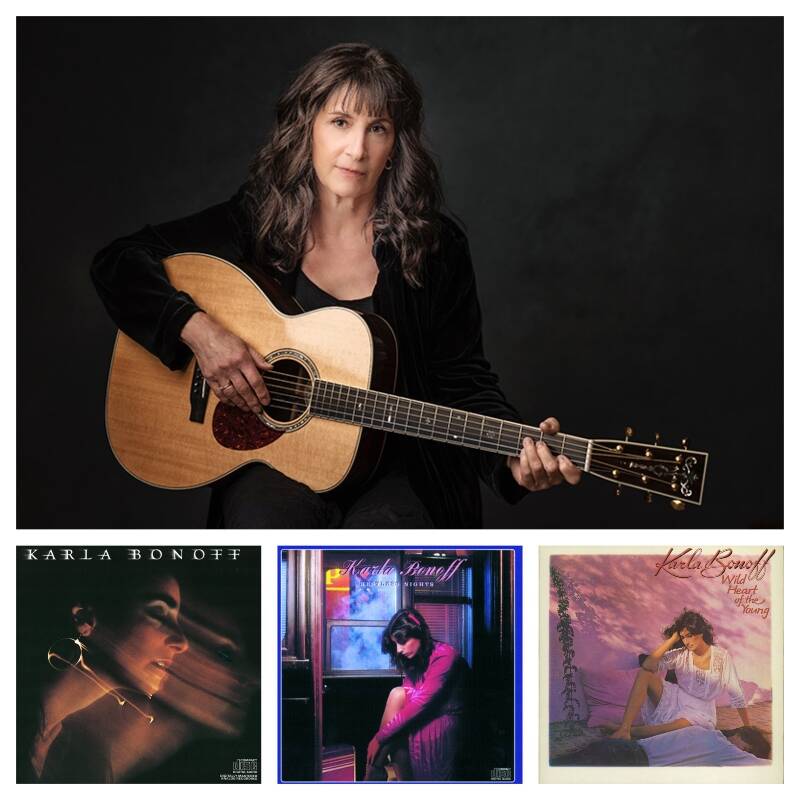“Long before Alanis and Jewel, there was a breed of singer/songwriters whose earthly anthems of soul-searching heartache and joy touched souls in a way few can muster today.”
So said Billboard Magazine, in a rapturous review of Karla Bonoff’s music — positioning Bonoff in her rightful place in the pantheon of singers and songwriters who created the soundtrack for a generation of young people coming of age in the 1960s, 70s and 80s.
Her powerful ballads, skillful playing on guitar and piano, and soaring soprano have now stood the test of time — sounding better than ever, in fact — and at 7:30 p.m. on Thursday, March 7, she’ll appear in an intimate concert in the 350-seat Kay White Hall of Vashon Center for the Arts.
The concert is a kickoff to an 11-city tour across the United States, with stops in venues both large and small in Seattle, Portland, Chicago, and other cities.
Islanders shouldn’t miss the chance to see Bonoff — a revered master of the emotive yet intricately polished Southern California sound of the 1970s — up close and personal at VCA.
There, with her longtime bandmate Nina Gerber, she is likely to play the songs that have defined her own career as well as those of her contemporaries in the music business.
These include “Home” — one of Bonoff’s tenderest ballads that first appeared on her 1977 self-titled album, and gained even more popularity when it was recorded the same year by Bonnie Raitt. Forty-two years later, in 2019, the song found a new audience on an album by country music queen Trisha Yearwood.
Bonoff’s classic love song, “All My Life,” is also likely on her VCA set list. The song debuted on Bonoff’s 1988 album “New World,” but was turned into a megahit a few years later by Linda Rondstadt and Aaron Neville, who won a 1991 Grammy Award for their soaring duet of the song.
As a contemporary and fellow traveler with the likes of Jackson Browne — she opened for him in 10,000-seat venues during his 1977 “Running on Empty” tour” — Bonoff came up in the heady Los Angeles music scene of the late 1960s and 70s, playing open mic nights at the fabled nightclub, The Troubadour, where she forged connections to last a lifetime in the music business.
Rondstadt’s versions of her songs, “Someone to Lay Down Beside Me,” “Lose Again,” and “If He’s Ever Near,” were heard by millions on Rondstadt’s 1976 album, “Hasten Down the Wind,” leading to a recording contract for Bonoff that yielded three albums with Colombia Records.
The last of this trio of records, “Wild Heart of the Young,” (1982) featured Bonoff’s bopping and supremely sexy rendition of her top-forty hit, “Personally” — a song she did not write but nevertheless indelibly carved into the memories of millions of listeners worldwide.
Fast forward to now — a time that still finds Bonoff writing, touring internationally (she is particularly popular in Japan, still building on a fan base established decades ago by Columbia Records), and releasing new music.
Her recent albums include “Carry Me Home” in 2019, and “Silent Night,” an album of Christmas songs recorded in the early, dark days of the COVID lock-down.
The latter album — called out in a New York Times review of the best Christmas albums of 2020 — included a remarkable cover of “River,” a song by one of Bonoff’s greatest songwriting heroes, Joni Mitchell.
At age 72, how does Bonoff still manage to sound and look decades younger than her years, and persevere in a music business that has changed in almost every way? And from what deep well of creativity has she continued to write such powerful songs?
In a phone interview last week, Bonoff called herself “genetically blessed, health-wise,” but said she had also now had to work harder to take care of her voice.
“Your vocal cords are a muscle — you have to use it or lose it — so all of these things require more attention,” she said, adding that she always considered herself to be a musician and songwriter first. Singing was a skill that came later for her, requiring practice and training, she said.
Recalling her days as a young artist in a “golden time” when not only she and others, including Jackson Browne, the Eagles, and Seal & Croft, had catapulted to fame from the stage of the Troubadour in Los Angeles, Bonoff expressed gratitude for her longevity as a songwriter and performer.
These days, she said, her audiences are primarily comprised of people of her own generation — ardent followers who first heard her music in their college years — and sometimes come up to her after shows to tell her it has been on their bucket list for decades to hear her sing live.
But others who show up for her concerts, she said, are the now-grown children of those original fans.
These millennial-aged audience members sometimes tell her, to her delight, that during their childhoods, “My mom played your records every day,” she said.
When asked about her songwriting — exactly how she had reached inside herself to craft her most beloved ballads and catchy pop masterpieces, Bonoff answered in a way that preserved the mystery of her process.
“When you have a natural ability, you don’t analyze it, or ask why the songs connected with people,” she said. “I frankly wonder, too, how I accessed that. It has been just as surprising to me, and I’m so grateful for that ability and for the kind of life it has afforded me to live.”
Purchase tickets to Karla Bonoff’s March 7 concert at vashoncenterforthearts.org.


